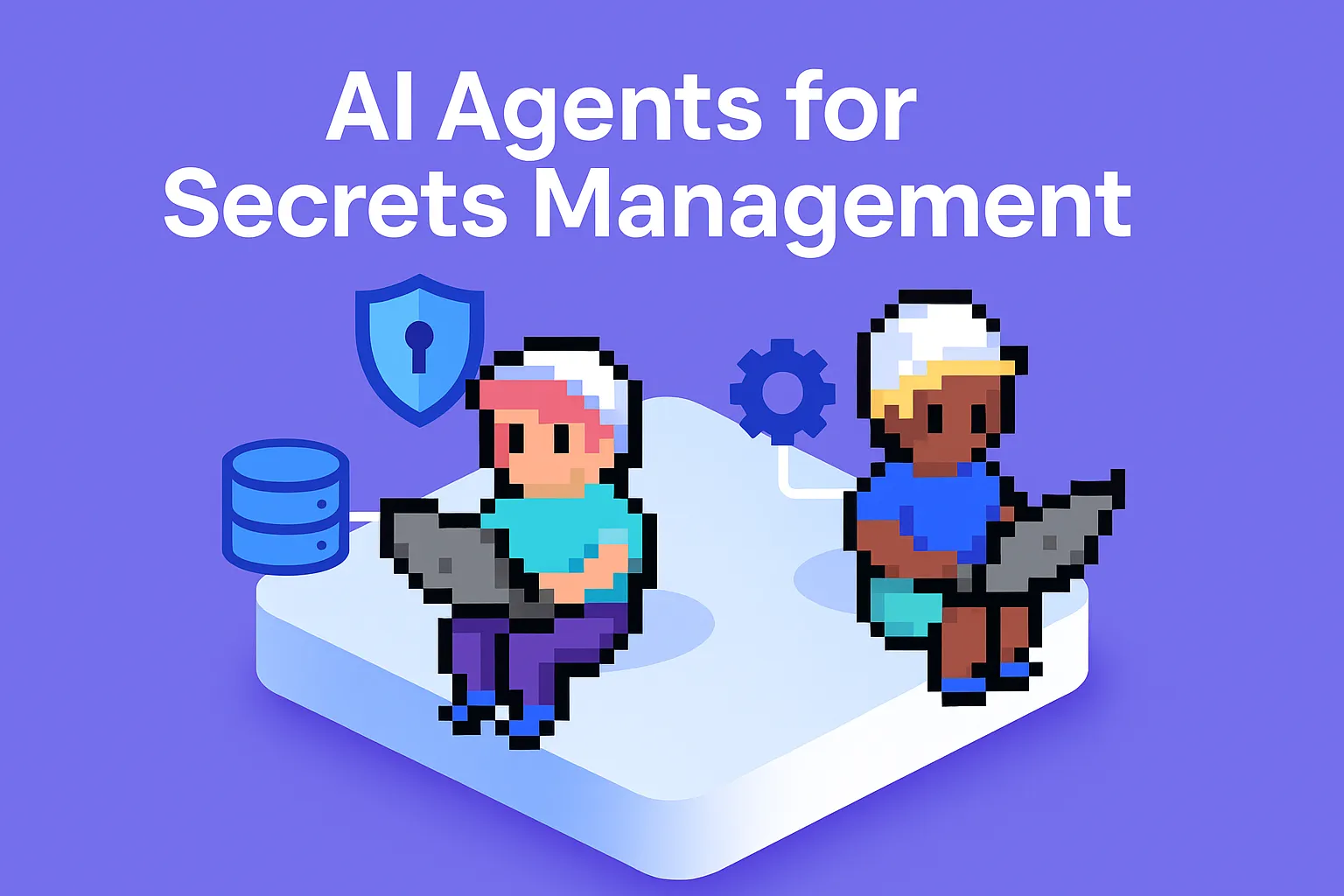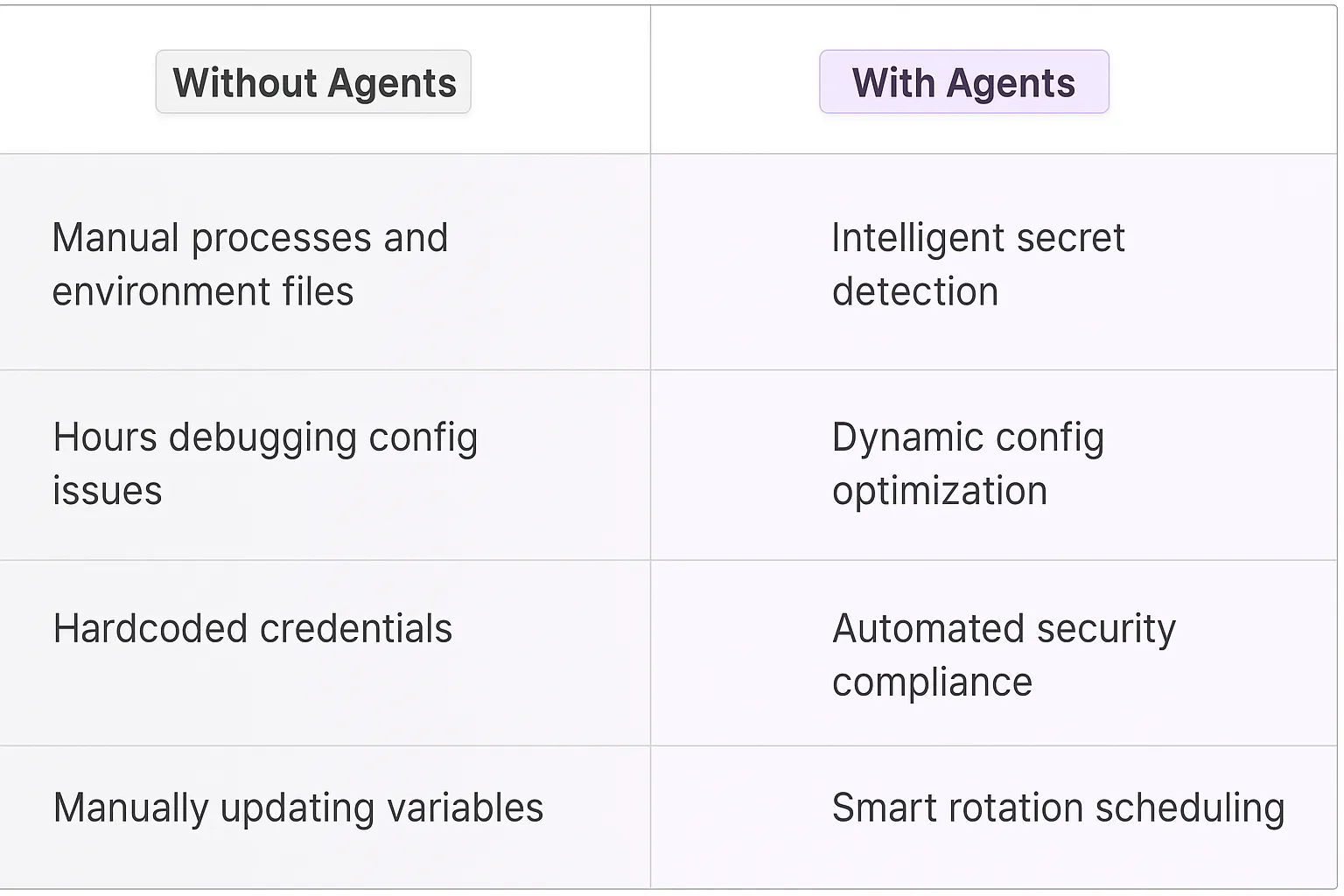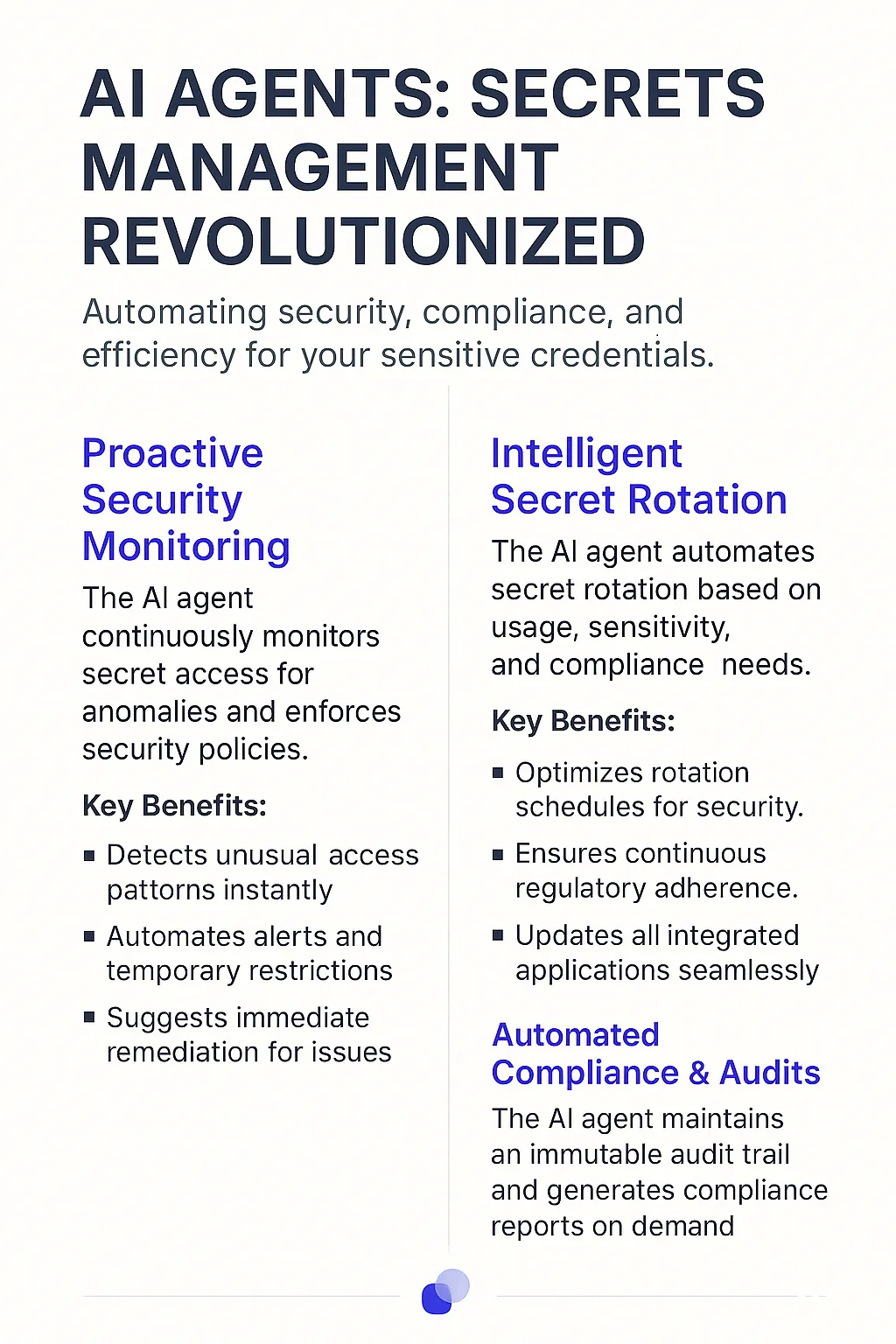Doppler
Understanding Doppler's Core Platform and Features
What is Doppler?
Doppler stands as a modern secrets management platform that safeguards sensitive information like API keys, credentials, and configuration variables. The platform provides a centralized, secure environment where development teams can store, manage, and distribute sensitive data across their applications and infrastructure.
Key Features of Doppler
- Centralized secrets management with military-grade encryption
- Environment-specific configuration management
- Granular access controls and detailed audit logging
- Seamless integration with popular development tools and platforms
- AI-powered security monitoring and optimization
- Automated secret rotation and lifecycle management

Benefits of AI Agents for Doppler
What would have been used before AI Agents?
Development teams traditionally managed secrets and configuration variables through a combination of manual processes, environment files, and basic key-value stores. Engineers spent countless hours debugging configuration issues, manually updating variables across environments, and dealing with the security risks of hardcoded credentials in code repositories.
What are the benefits of AI Agents?
AI Agents transform how development teams handle secrets management and configuration in Doppler through several key mechanisms:
- Intelligent Secret Detection: AI Agents scan codebases to identify potential secrets and sensitive information that should be moved to Doppler's secure storage. This proactive approach catches security risks before they make it to production.
- Dynamic Configuration Optimization: The AI analyzes application behavior and usage patterns to suggest optimal configuration structures and hierarchies. This reduces configuration drift and maintains consistency across environments.
- Automated Security Compliance: AI Agents continuously monitor secret usage and access patterns, flagging potential security risks and ensuring compliance with security policies. They can detect unusual access patterns or potential credential leaks in real-time.
- Smart Rotation Scheduling: Based on usage analytics and security best practices, AI Agents determine optimal rotation schedules for different types of secrets. This balances security requirements with operational stability.
- Configuration Debugging: When issues arise, AI Agents can quickly analyze configuration states across environments to pinpoint discrepancies and suggest fixes, reducing debugging time from hours to minutes.
The network effects are particularly powerful here - as more teams use AI-enabled Doppler, the system becomes increasingly adept at identifying configuration patterns that lead to robust, secure applications. This creates a flywheel effect where each team benefits from the collective learning across the entire user base.

Potential Use Cases of AI Agents with Doppler
Processes
Doppler's secret management capabilities combined with AI agents create powerful workflows for development teams. The AI agent can monitor secret rotation schedules and automatically update credentials across multiple environments. When developers need to share access tokens or API keys, the AI agent handles the secure distribution while maintaining detailed audit logs.
For complex microservice architectures, the AI agent proactively identifies potential secret sprawl issues by analyzing secret usage patterns. It flags unused or duplicate secrets and recommends consolidation opportunities to maintain better security hygiene.
Tasks
Development teams can leverage AI agents to automate several critical secret management tasks:
- Dynamic secret generation following security best practices and compliance requirements
- Automated secret rotation based on customizable schedules and risk profiles
- Real-time monitoring of secret access patterns to detect potential security anomalies
- Integration of secrets across CI/CD pipelines while maintaining zero-trust principles
- Automated secret syncing across multiple cloud environments and services
The AI agent also handles routine maintenance tasks like cleaning up expired secrets, updating access policies, and generating detailed compliance reports. For teams managing hundreds of secrets across different projects, the agent becomes an invaluable digital teammate for maintaining security standards.
Advanced Applications
Forward-thinking teams are using Doppler AI agents to build sophisticated secret management frameworks. The agent can implement dynamic access controls that adjust based on developer activity patterns and project requirements. It analyzes historical secret usage data to suggest optimizations in secret organization and access patterns.
When integrated with existing security tools, the AI agent creates a comprehensive secret governance system. It can correlate secret access patterns with application logs to identify potential security risks and provide actionable remediation steps.
For organizations scaling their cloud infrastructure, the AI agent helps maintain consistent secret management practices across new environments and team members. It automatically enforces naming conventions, access policies, and rotation schedules as the infrastructure grows.

Industry Use Cases
Doppler AI agents are transforming how teams handle sensitive data and secrets management across multiple sectors. The real power lies in how these digital teammates adapt to different operational contexts while maintaining enterprise-grade security standards. From startups to Fortune 500 companies, organizations are discovering unique ways to leverage Doppler's AI capabilities for their specific security and compliance needs.
The integration of AI within Doppler's ecosystem creates a proactive approach to secrets management - one where potential security gaps are identified before they become vulnerabilities. Rather than just storing and managing secrets, these AI agents actively participate in maintaining security hygiene, suggesting improvements, and adapting to evolving security requirements.
What makes these implementations particularly compelling is how they blend automated intelligence with human expertise. Development teams can focus on building features while AI agents handle the complex orchestration of secrets across environments, ensuring consistent security practices without creating bottlenecks in the development pipeline.
Software Development Teams Strengthen Security with Doppler AI
Modern software development teams face a critical challenge: managing hundreds of API keys, credentials, and environment variables across multiple applications and deployment environments. A mid-sized development team typically handles over 300 different secrets across their tech stack. When these secrets aren't properly managed, security breaches happen.
Doppler AI acts as a digital teammate focused specifically on secrets management, monitoring how developers interact with sensitive credentials and spotting potential security risks before they become problems. When a developer accidentally commits an API key to a public repository or uses production credentials in a testing environment, Doppler AI immediately flags the issue and suggests corrective actions.
The AI analyzes patterns in how teams use and share secrets, building a security profile for each project. For example, if a team typically accesses database credentials during business hours but suddenly sees unusual access at 3 AM, the AI can alert security teams and temporarily restrict access until the activity is verified.
Beyond basic monitoring, Doppler AI helps teams implement security best practices by automatically suggesting secret rotation schedules based on usage patterns and compliance requirements. It can identify unused or outdated secrets that should be revoked, reducing the attack surface of applications.
The results speak for themselves: development teams using Doppler AI report 90% fewer secret-related security incidents and save an average of 15 hours per week previously spent on manual secrets management tasks. This shift from reactive to proactive secrets management represents a fundamental improvement in how development teams handle sensitive information.
Fintech Companies Scale Security with Doppler AI
Financial technology companies process millions of sensitive transactions daily while juggling complex regulatory requirements. The average fintech startup manages over 500 different API keys, payment processor credentials, and encryption keys - each one a potential security vulnerability if mishandled.
Doppler AI functions as a specialized digital teammate for fintech security teams, providing continuous monitoring of how sensitive financial credentials flow through various systems and environments. When unusual patterns emerge, like multiple failed authentication attempts or unexpected access to production payment keys, the AI takes immediate action to prevent potential breaches.
The AI builds comprehensive audit trails by analyzing how different teams interact with financial secrets. For instance, when engineers need to debug payment processing issues, Doppler AI automatically provisions temporary credentials with limited scope rather than exposing full production access. This granular control significantly reduces risk while maintaining development velocity.
Through machine learning analysis of secret usage patterns, Doppler AI helps fintech teams stay ahead of compliance requirements. The system learns which credentials are subject to specific regulations like PSD2 or SOC 2, then automatically enforces appropriate rotation schedules and access controls. It can even predict when certain secrets may become non-compliant based on changing usage patterns.
The impact on fintech operations is substantial: companies using Doppler AI report 95% faster secret-related compliance audits and an 80% reduction in security incidents related to credential mismanagement. For growing fintech companies, this level of automated security intelligence transforms secrets management from a bottleneck into a competitive advantage.
Considerations and Challenges
Implementing Doppler AI agents requires careful planning and awareness of several key factors that can impact success. Organizations need to evaluate their technical infrastructure, data governance policies, and team readiness before deployment.
Technical Considerations
API integration complexity often emerges as a significant hurdle when deploying Doppler agents. Teams must ensure their existing systems can handle the additional load and data processing requirements. Network latency and bandwidth constraints can affect real-time interactions, particularly in organizations with distributed teams or multiple office locations.
Data security protocols need thorough evaluation, as Doppler agents interact with sensitive information across various systems. Implementation teams should establish robust encryption standards and access controls to protect data in transit and at rest.
Operational Challenges
Team adoption patterns show that without proper change management, digital teammates can face resistance or underutilization. Organizations must invest in comprehensive training programs that demonstrate practical use cases and clear value propositions for different roles.
Resource allocation becomes crucial during the implementation phase. Teams need dedicated personnel to monitor agent performance, handle exceptions, and maintain system health. This often requires new skill sets and responsibilities within existing IT teams.
Integration Complexity
Legacy system compatibility presents unique challenges when integrating Doppler agents. Organizations running older software versions or custom solutions may need to develop specialized connectors or middleware to ensure smooth operation.
Data flow orchestration between multiple systems demands careful planning to prevent bottlenecks and ensure consistent performance. Teams must establish clear protocols for handling API rate limits, data validation, and error recovery scenarios.
Scaling Considerations
As usage grows, organizations must plan for increased computational demands and data storage requirements. Performance monitoring becomes essential to maintain response times and system reliability under higher loads.
Cost management strategies should account for both direct implementation expenses and ongoing operational costs. Teams need to establish clear metrics for measuring ROI and adjusting resource allocation based on actual usage patterns.
AI-Driven Security Evolution: The Future of Secrets Management
The integration of AI Agents with Doppler marks a fundamental shift in secrets management and security automation. Organizations across industries are experiencing tangible benefits - from 90% reduction in security incidents to 15-hour weekly time savings in manual tasks. The combination of intelligent automation and human expertise creates a robust security framework that scales with organizational growth.
As security threats evolve and compliance requirements become more complex, the role of AI Agents in secrets management will become increasingly critical. The system's ability to learn and adapt from collective experiences positions it as an essential tool for modern development teams focused on maintaining strong security postures while accelerating development velocity.













